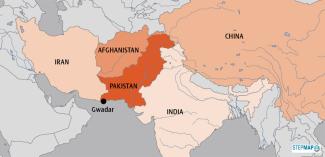Comment
Much needed injection of capital

The CPEC’s guiding idea is to link China’s western regions to the Arabian Sea. The plan is to build an up-to-date commercial port in Gwadar and modernise road, rail and other infrastructure projects from there to the Chinese border in Pakistan’s northeast. The approach is quite comprehensive and includes power stations, airport facilities, a metro line in Karachi and even primary schools.
The CPEC is getting massive funding. So far, $ 51 billion of foreign money has been committed to investments in Pakistan. This sum includes yet another $ 5.5 billion loan that China’s government pledged in September on top of its prior commitments. The Asian Development Bank (ADB) had earlier increased its pledges by $ 2.5 billion, and the new Asian Infrastructure Investment Bank, which is based in Beijing, will contribute $ 300 million, partially in a cofinancing scheme with the ADB (see D+C/E+Z e-Paper 2016/06, p. 4).
Construction work has begun in Pakistan and is apparently progressing well on several sites. The CPEC is a showcase model for what China wants to achieve with its One Road One Belt policy. This policy is designed to facilitate growth by improving transport and business options outside the People’s Republic.
The massive capital injection may jumpstart Pakistan’s economy, which desperately needs investments. In the past financial year, the ratio of investments to GDP was a mere 15 %. In 2006/07 it had been 20 %. Under- and unemployment are serious problems, especially in view of Pakistan’s huge youth bulge.
Pakistan’s investment climate is adversely affected by several issues. Pakistan only returned to democracy in 2008. Institutions tend to be weak, policies incoherent and mistrust between provinces is strong (see D+C/E+Z e-Paper 2016/09, p. 26). The country has a long history of poor governance. Moreover, it is located in a volatile neighbourhood, with Afghanistan and Iran in the west, India in the east and China in the northeast. The wars in Afghanistan and militant violence have severely affected Pakistan.
Many Pakistani business houses prefer investing abroad to building productive capacities at home. To many of them, it looks less risky to invest in Bangladesh, Vietnam, Singapore or Malaysia, for example. When the real-estate bubble burst in Dubai and other places in the Gulf states a few years ago, massive investments from Pakistan were uncovered.
The CPEC could well make a difference. According to Finance Minister Ishaq Dar, Pakistan desperately needed a major investment push to escape its “low-investment, low-growth cycle”. In his eyes, CPEC is providing that thrust.
Zahir Shah, who is in charge of the CPEC at Pakistan’s Ministry for Planning, Development and Reform, says: “We expect a million jobs to be created in Pakistan in the short run.” He adds that the “long-run impact will be tremendous”, but cannot be fully assessed yet. According to him, Chinese work culture and speed are amazing.
The CPEC has serious geopolitical implications. Pakistan has long been allied to the USA, but the mood has soured, not only because of the war in Afghanistan. Moreover the IMF, which is dominated by western powers, imposed austerity on the country, hampering its economic development. In this context, Chinese trust in Pakistan’s potential looks inspiring.
Pakistan’s leaders are enthusiastic, and the Chinese patrons are unwavering. Whether that is sufficient for ensuring timely completion remains to be seen. Several CPEC-related energy projects have already hit snags, primarily because they were prepared in haste. Private-sector partners now want to renegotiate deals or drop out entirely.
Some setbacks are to be expected in any major infrastructure project. If there are too many of them, however, projects get derailed. A big question is thus whether Pakistan’s institutions prove strong enough to implement the CPEC effectively. If they do, they may actually turn around the country’s economy in the long run.
Afshan Subohi is a business journalist and works for Dawn, a national newspaper in Pakistan.
asubohi@hotmail.com







